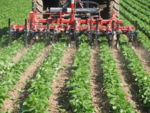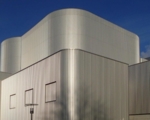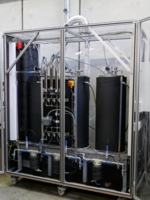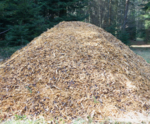Current articles on bioeconomy-related topics
-
Outlook on the future of agriculture - 30/11/2020

The demand for organic products is continuing to grow; at the same time nature is being preserved – so why not switch completely to organic farming? The answer is simple: because not everyone can afford it, and with current consumption patterns not everyone would get enough to eat. A cooperative project is researching an an agricultural system that falls between conventional and organic farming.
-
Development of biogenic packaging - 16/11/2020

Modern packaging often boils down to a tick list of biogenic origin and/or biodegradability. But comprehensive sustainable packaging concepts need more than just that. Perishable foods, for example, require special barrier properties. The Albstadt-Sigmaringen University of Applied Sciences is researching packaging concepts for their sustainability.
-
Dossier - 09/11/2020

What will the packaging of the future look like, and what will be required of it? Can packaging be biobased, recyclable, sustainable and economic? In Baden-Württemberg, there are various approaches to developing packaging with the above properties from various sources including agricultural residual and side streams as well as municipal waste.
-
Phosphorus recovery from sewage sludge - 21/10/2020

Biotechnology for the bioeconomy: in something known as the P-bac process, sulphur bacteria extract phosphorus from sewage sludge ash. Phosphorus is one of the key building blocks of life and an essential nutrient for plant growth. When there is not enough phosphorus in the soil, farmers apply it via organic or mineral fertilisers.
-
Qualitative soil fertiliser - 10/07/2020

Recycled material instead of waste: wood ash is good for soil and plants - if the quality is right. The German Federal Quality Association for Food Ash ensures reliable wood ash standards with its certifications. The RAL-Dünger label for fertilisers provides the necessary certification for natural wood ashes to be used in the circular economy.
-
rezemo GmbH - 26/06/2020

In Germany alone, around three billion disposable coffee capsules made of aluminium and plastic are sold every year. This creates a gigantic waste problem, as only a small proportion of the capsules can be recycled. Fully compostable wooden coffee capsules might be a solution to this problem. The capsules have been developed by a start-up company called rezemo, which also has other biobased packaging solutions in the pipeline.
-
Perspectives of methane as energy source - 18/06/2020

The microorganisms in biogas plants do a great job biologically converting CO₂ and hydrogen, which are primary fermentation products, into methane. Biomethane has a great future as an energy source. Scientists at the University of Hohenheim are investigating new ways to produce and use biomethane.
-
Degradable biopolymers - 29/05/2020

Innovative technologies and bacteria can transform wood residues into sustainable bioplastic packaging. Before bioplastics are broken down into CO2 and water in an environmentally friendly way, they can thus lead lives as products in the cosmetics industry, for example.








